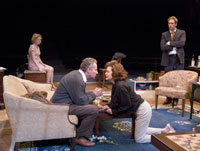___________________
______________________________________________

Arts
in Review
by
Carol Davis
____________________________________________
George and Martha are at it again!
SAN DIEGO—In the final scene of Edward Albee’s tragi/comedy, Who’s Afraid of Virginia Woolf? George puts his hand gently on Martha’s shoulder, she puts her head back, and he sings to her very softly : “Whose afraid of Virginia Woolf, Virginia Woolf, Virginia Woolf’”,… and she responds through teary eyes, “I… am George…I…am…”(George nods slowly) (Silence, tableau) Curtain. WOW! Who would have guessed?
Virginia Woolf is not just some old play written in 1962. It is more like a battlefield for George and Martha, who have been waging this mêlée since their marriage began. It’s the play that put Albee on the map and changed the tone of contemporary literature. Howard Taubman of The New York Times said that Virginia Woolf : “…towers over the common run of contemporary plays. It marks a further gain for a young writer becoming a major figure on stage.” And Newsweek said, “…a brilliantly original work of art- an excoriating theatrical experience, surging with shocks of recognition and dramatic fire.”
You don’t have to trust these critics. These reviews were written after it was performed off-Broadway in 1962 and then went on to win the New York Drama Critics Circle and Tony Awards as the Best Play of the 1962-’63 season. Just head down to the Cassius Carter Theatre at The Old Globe in Balboa Park and make your own judgments.
Unlike the times of its premiere on Broadway and in Hollywood at its opening, we as a society are more accustomed to the four letter words, the marital breakups, the dysfunctional family life seen in movies and TV, but it doesn’t make it any easier.
I don’t think anyone is really ever prepared for the drama of and in Virginia Woolf but every now and then theatres take it out, dust it off and present their interpretation of what they think it should look like. Unsettling as it may seem, survival is the name of the game in this play and these two will do anything to survive the nightmare they have made for themselves. And unsettling as it may be, theatre companies owe it to their audiences to mount it, if for nothing else but to see a classic.
The definitive Virginia Woolf seems to be the movie version starring Elizabeth Taylor* and Richard Burton. directed by Mike Nichols. It was brutal, as those who remember the show can now attest. Taylor took home the Academy Award for her performance as Martha. That was in 1966.
Everyone wants their Virginia Woolf to look like the movie version. That it
doesn’t happen is OK. In director Richard Seer’s production, quite the
opposite happens. But more on that later.
As presented in the round, the powers that be at The Globe have a concept
that the Classics should be up close and personal, and this one is.
 Sitting in this intimate space the characters are in our face close and we
are almost in Martha (Monique Fowler) and George’s (James Sutorius) living
room (Alan E. Muraoka designed the sets) which is a cluttered mish mash of
furniture with clothes strewn about. Not to be unnoticed, however, there are
no less than a dozen cocktail glasses lined up on a low hutch on one side
with
liquor galore. Eventually those glasses end up resting on one table or
another throughout the night.
Sitting in this intimate space the characters are in our face close and we
are almost in Martha (Monique Fowler) and George’s (James Sutorius) living
room (Alan E. Muraoka designed the sets) which is a cluttered mish mash of
furniture with clothes strewn about. Not to be unnoticed, however, there are
no less than a dozen cocktail glasses lined up on a low hutch on one side
with
liquor galore. Eventually those glasses end up resting on one table or
another throughout the night.
L-R: Sturgis, Sutorius, Fowler, Ferrarra
When the play opens, the couple is just coming home from visiting her father, the president of the college, somewhere in Massachusetts, where George teaches. George is in the History department (two bones of contention; the president and the teacher as opposed to The Head of the Dept.).
They are both three sheets to the wind, and instead of going to bed, they are awaiting the arrival of a new faculty member, Nick (Scott Ferrara) and his wife Honey (Nisi Sturgis). It’s two o’clock in the morning and they are just warming up for the next round of blows to keep the adrenalin pumping. To their unsuspecting guests, they haven’t a clue as to what’s coming. Heaven help them.
As I mentioned earlier, Fowler’s Martha is not quite as vulgar, unkempt, vicious, nasty, brutal or pious as the classic Taylor’s was. She just nuzzles in and, in her own way, in three acts and no less than three hours, pushes George to the brink. Her voice doesn’t irritate or grate on the nerves. It does have a distinct accent, but not recognizable. She is just plain mean spirited and drunk! But don’t underestimate. She knows how to get George going. Fowler, a Globe Associate has appeared in many Globe productions over the years and has never disappointed. Her Martha is different. It works.
But on opening night, she fell a little short of being on target in the first act.
Au contraire, it’s Sutorius’ George who appears to have won the upper hand when all the votes are in and the final bell has sounded. His performance, while quiet, is sharp, focused, painful sometimes comical and point blank. It comes at staccato intervals and he jabs like a boxer playing with his opponent. Sutorius is a master of all he surveys and has in no way fallen victim to her ugliness.
He seems to have a plan for the game and he follows
it through. Unfortunately for Martha, she has opened door number three and it turns out the she chose the wrong night to confide in Honey that they have a son. All the worms came crawling out of the can and the story and the existence of the ‘little bugger’ was finally exorcized; put to rest, in a highly dramatic give and take, much to her chagrin and their guest’s awe.
Sutorius, a fine actor who has proven himself to Globe watchers, won the San Diego Theatre Critics Award for Best Featured Actor in a Play, Lincolnesque. He seems to have captured the essence of George; not too loud, not too overpowering, not too funny but overbearing enough in his constant barrage of babble to wear both Martha and Nick down. Scott Ferrera was right on target on opening night as the sometimes defiant sometimes baffled Nick and Nisi Sturgis was perfect as Honey the milquetoast wife who tricked her husband into marrying her only to be lost in an another empty (nest) marriage.
Sears’ direction, whilst walking that fine line of balancing humor and pathos, puts this Virginia Woolf into the category of must see. It plays through June 24. Tickets may be obtained by calling the box office at (619) 231-194.1
See you at the theatre.
*In 1957 Taylor
converted to Judaism and in 2001, was asked on “Larry King Live”, “You are
Jewish, are you not?” and she replied “I am, I am.” In 1981 she narrated
parts of Genocide produced by the Simon Wiesenthal Center. It went
on to receive the 1981 Academy Award for best documentary, the first
Holocaust documentary to be given this honor. It was the very first review I
had published at the beginning of my long tenure as an Arts Critic.